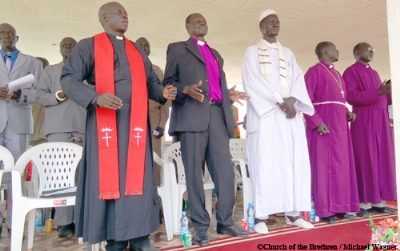Top regional religious leaders call for end to war in South Sudan
September 23, 2016 (JUBA) – Top ranking regional religious leaders have on Friday called for an end to South Sudan’s conflict, saying violence in all its forms does not resolve the differences but “begets violent destruction.”

It was not immediately clear what the top religious leaders have told the president and whether or not he accepted their pleas to end the violent conflict which erupted on 8 July and instead implement the peace agreement wholly without reservations.
But in a brief statement issued to journalists after their meeting with the South Sudanese president, the religious leaders said that millions of innocent civilians in the country are victims of war and are pleading for peace, often receiving nothing but the “bitter vinegar of rejection,” their cries silenced “with the same ease with which television channels are changed.”
The indifference to suffering, according to the statement, which it said is a product of war, is a virus “that paralyzes, rendering us lethargic and insensitive, a disease that eats away at the very heart of religious fervor, giving rise to a new and deeply sad paganism.”
“The families whose lives have been shattered by war, the children who’ve known nothing but violence, the elderly who’ve been forced to abandon their countries, all of them have a great thirst for peace,” the statement said.
“We appeal to the leadership to put a stop to war and bring peace, a true peace that is not illusory,” they said.
Peace, they advised, has to be built by giving “first place” to those who suffer, fixing conflicts from within, through a consistent goodness and rejecting the “shortcuts offered by evil.”
They said peace means forgiveness; welcome and openness to dialogue; cooperation, and education, which the statement described as a call to learn “the challenging art of communion.”
The top religious leaders further added that victims of war hardly get attention they deserve from the authorities.
“Who listens to them? Who bothers responding to them? Far too often they encounter the deafening silence of indifference, the selfishness of those annoyed at being pestered, the coldness of those who silence their cry for help with the same ease with which television channels are changed,” they lamented.
The statement further stressed that “the lust for power and money, the greed of arms dealers, personal interests and vendettas for past wrongs,” and the underlying causes of conflicts, including “poverty, injustice and inequality, the exploitation of and contempt for human life, are the bad deeds haunting the nation.
(ST)
